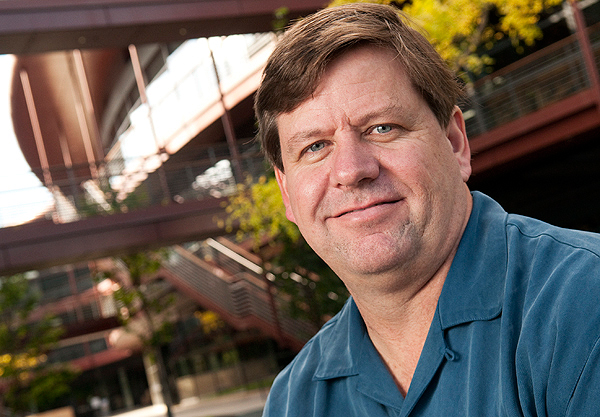Reese Zasio, a 'near-magic man,' to receive 2009 Marsh O'Neill Award
Reese Zasio, facilities operations manager of the Veterinary Service Center, will receive the 2009 Marsh O'Neill award at a 4 p.m. reception on Wednesday, Nov. 11, at the Faculty Club.
Unsung hero. Go-to guy. Near-magic man. One of Stanford's treasures. The anti-bureaucrat. A tireless worker for the proper treatment of lab animals.
Those are some of the accolades heaped upon Reese Zasio, winner of the 2009 Marsh O'Neill Award, which honors staff members who have made outstanding contributions to Stanford's research mission.
Zasio is the facilities operations manager of the university's Veterinary Service Center, which oversees animal husbandry for research animals. The center is part of the Department of Comparative Medicine in the Stanford School of Medicine.
The center provides animal housing and research facilities for about 300 faculty members. It is responsible for assuring that all use of animals is humane and complies with all relevant policies and legal requirements.
"All of the animals have to be fed, watered and housed in compliance with a multitude of regulations," Linda C. Cork, a professor of comparative medicine, wrote in a letter nominating Zasio for the award.
"A broad range of species have to be purchased, picked up in a timely fashion from airports or met when they arrive on loading docks, so they arrive safely at Stanford for faculty research – when the faculty want them," she wrote. "All of Stanford's animal facilities must be kept clean and in good repair so they meet exacting regulatory standards. All of the major equipment in the facilities – cage washers, autoclaves, biosafety cabinets, HVAC, etc. – must be fully operational all the time. It's a huge job and he makes it look easy."
Zasio will receive the award – and a check for $5,000 – at a 4 p.m. reception on Nov. 11 at the Faculty Club. Anyone who knows him is welcome to attend the event.
Zasio said he was "shocked, stunned and grateful for the people that submitted my name for this prestigious award."
Asked about the most enjoyable parts of his job, Zasio responded: "Working with all the different people both within and outside of our department. Knowing that I am part of a tremendous research environment and that I can ensure that the animals under our care receive the best possible treatment. It is also very cool when I hear or read of new treatments/therapies for people and that I/our group had a part in that success."
Zasio, who was hired as a temporary employee in 1982, later landed a permanent job as an animal care assistant. His job: washing cages. Six months later, he was again promoted and began providing direct daily husbandry for research animals. In 1986, Zasio became an animal husbandry supervisor, overseeing about 10 animal care assistants. He also took responsibility for a new centralized vivarium.
In 1990, Zasio became the facilities operations manager of the Veterinary Service Center, where he oversees a team that provides daily animal care, maintains research tools, including diagnostic and therapeutic X-ray machines, and works with regulatory agencies.
"In addition we test and evaluate new types of animal equipment that is more green and provides for healthier environments for the animals," Zasio said. "For example, we have been using recyclable mouse caging. This eliminates the need for the washing of cages, thus saving energy and enormous quantities of water."
Neurobiology Professor William Newsome said Zasio has one of the most difficult and important staff jobs at the university.
"Reese manages people, equipment, space and animals – all with the goal of delivering quality service to researchers," he wrote in a letter nominating Zasio. "… those 'in the know' are aware that Reese in a near-magic man. He routinely finds creative solutions to complicated problems when no one else seems able to find a way."
Neurobiology Professor Ben Barres, who has worked closely with Zasio for about 17 years, praised his efficiency, professionalism, problem solving and leadership abilities in a letter nominating Zasio for the award.
"He has always been there for my lab, doing whatever it takes to help our research get done, often exerting himself way beyond the call of duty," Barres wrote, citing the time Zasio helped him consolidate all of his lab mice in one room to stop the transmission of viral infections from other mice.
Radiology Professor Michael Moseley, who is the chair of the Administrative Panel on Laboratory Animal Care at Stanford, described Zasio as the "go-to guy" to whom everyone turns with problems, issues, special needs and future demands.
"He has made Stanford a first-class research institution," Moseley wrote in a nominations letter. "We at Stanford stand tall in our respective fields worldwide, largely because we are standing on the shoulders of dedicated and capable people like Reese Zasio."
The dean of research established the Marsh O'Neill Award in 1990. It was named for its first recipient, Marshall D. O'Neill, who retired in 1990 after nearly four decades as associate director of the W. W. Hansen Experimental Physics Laboratory. A faculty panel chooses the award winner.
Including Marsh O'Neill, Zasio will be the 29th staff member to receive the award. (In some years, the award has gone to two staff members.)


Share This Story